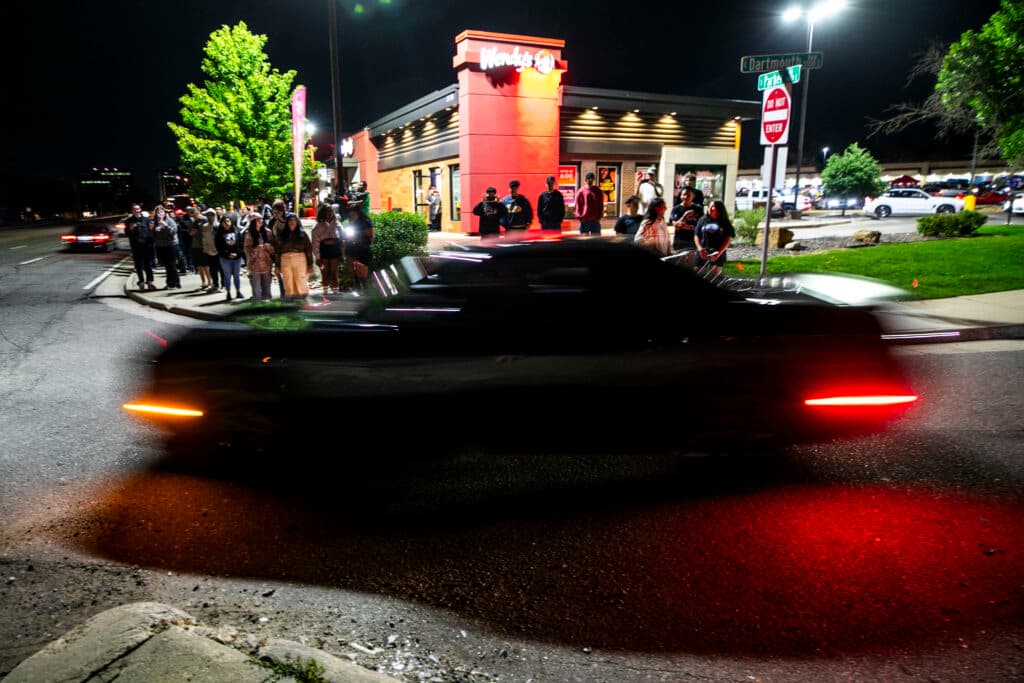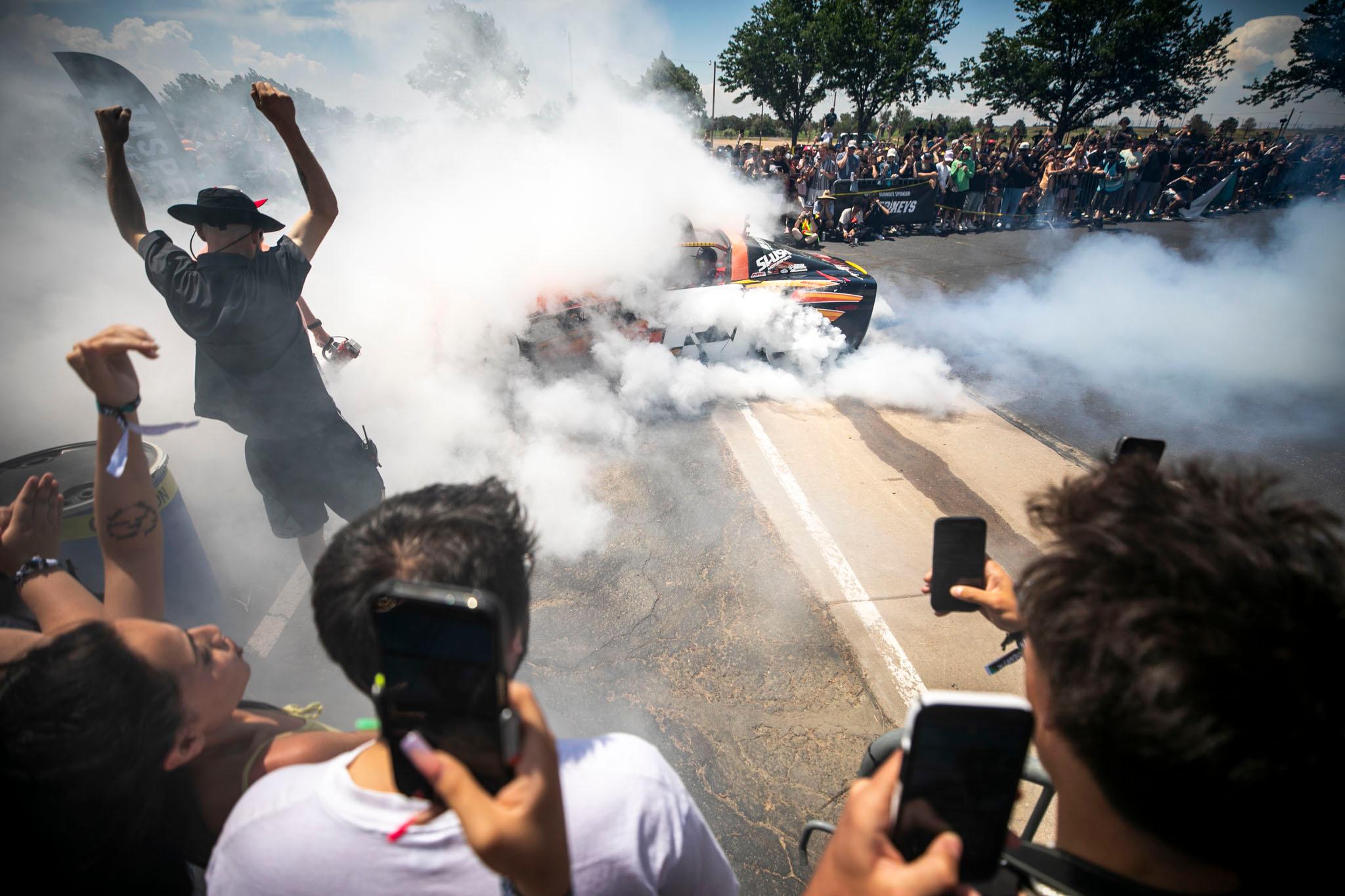A plume of smoke billowed from a parking lot at the Adams County Fairgrounds last spring as thousands of people watched and cheered. They held up their phones, recording the spectacle of roaring engines and screeching tires.
Usually, the metro's motor heads meet after dark, when police are more watchful and the line between legal and illicit becomes thin. But this event, Down To Earth Days, was created to allow for a vibrant culture to thrive in daylight — apart from drama that can unfold late at night.
"It can be a dangerous scene, so these shows are meant for people to have an environment to showcase the work they put in [to their cars]," AJ Ranasinghe, founder of the Down to Earth lifestyle brand behind this event, told us. "That's not to hate on the night meets at all. I'm friends with some of them, and it's not them that's promoting the violence and all this stuff. It's just, when you get a lot of people together at night with cars, it just kind of carries on in its own way."
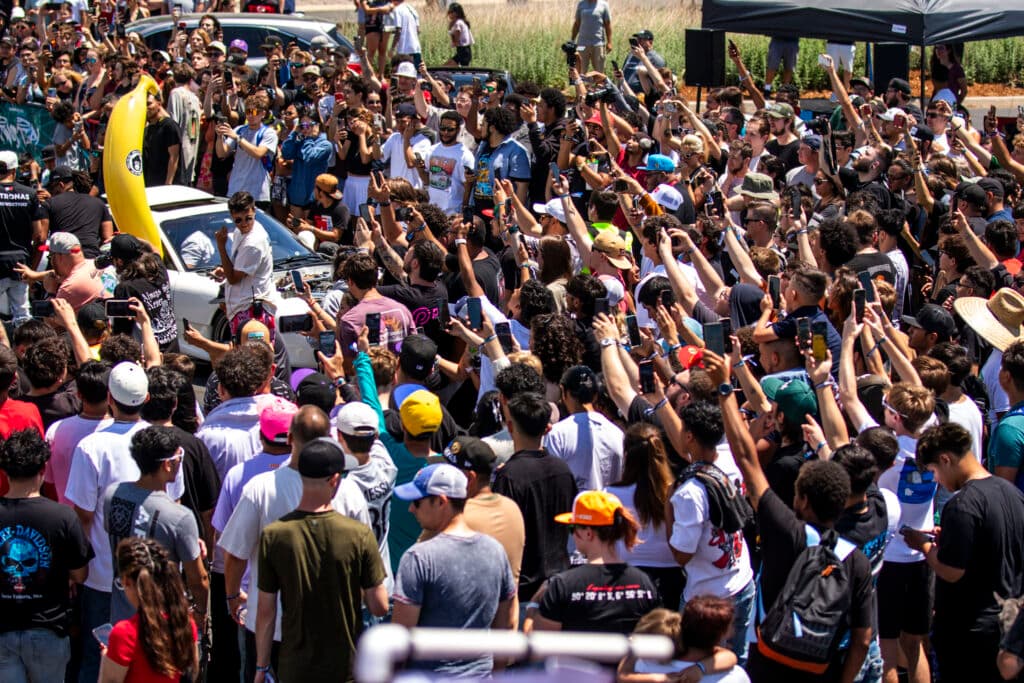
There are a lot of people in Denver working to limit how much space cars can occupy, from walkability advocates to urban planners who'd like to see more bike lanes and slower speed limits. The city’s streets are more dangerous than ever, and we often hear from readers complaining about cars that are too fast and loud in their neighborhoods.
But there are also a lot of people around the city who are deeply steeped in car culture, and they’re having their own discussions about how to fit in here. We spent some time in their scene to hear what’s on their minds.
There’s a huge audience for family-friendly meetups, but it’s getting harder to find a place to gather.
Ranasinghe founded Down to Earth a few years ago, when he was studying business marketing at Colorado State University. He’d dabbled in a few other businesses around skateboards and branding, but he saw a future with cars.
“It was like, I just want to do something I’m really passionate about now. And that's events. From the outside looking in it's like, alright, this is a congregation of car people. But from my perspective, and my day-to-day work, it's running a full-on experience for people and it's a viable business,” he said. “It's my full-time job, which is fantastic.”
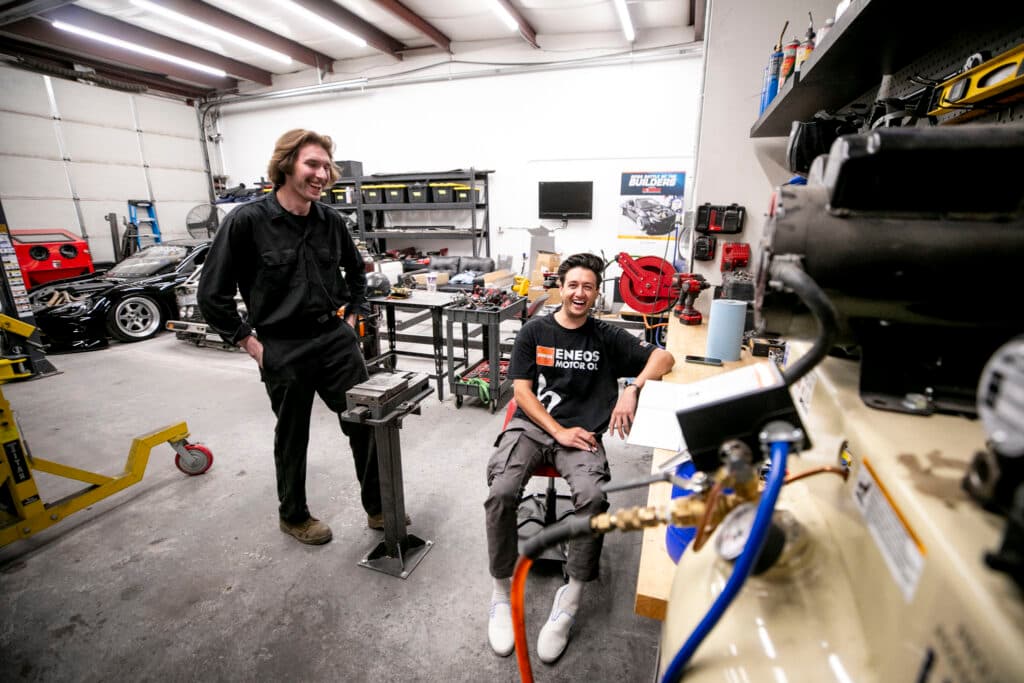
His meetup at the Adams County Fairground attracted huge crowds of people of all ages, who gathered to see burnouts and and watch drifters careen around a nearby track. The parking lot was lined with vendors selling stickers, clothes, food and auto parts. The event halls and parking spaces were filled with everything from one-of-a-kind racecars to teenagers’ first rides.
Some people, like builder Cam Cocalis, came to show off years of work they’ve put into custom cars. Others were just grateful to have a place like this to gather.
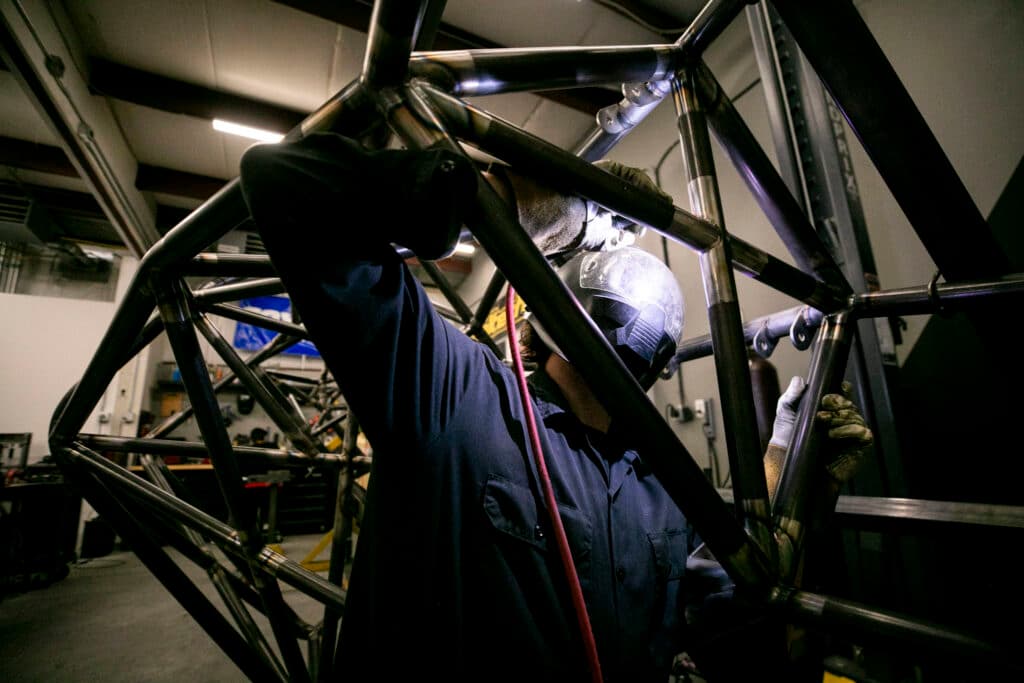
Tasha Denoyer, who showed up with her “Scream”-themed Alfa Romeo, said events like these have been important escapes for her since she got sober a few years ago.
Marnie Nocon brought a Subaru he’s been working on with his son for the last four or five years, and said he was looking for an event like this in the daylight.
“Colorado's kind of tough, but I would say there's a few shows here and there,” he told us. “So it's been nice to come here, and that it’s family friendly. But I wish there would be more in Colorado.”
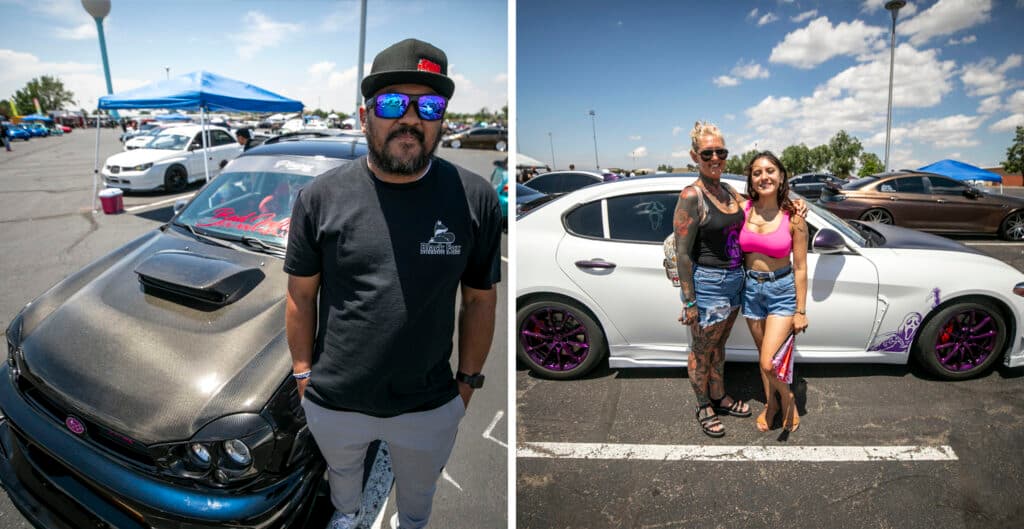
Ranasinghe said it’s expensive to put on events like these. The number of insurance carriers that will cover his liabilities has dwindled in recent years, and venue fees are sometimes unattainable. He’s not sure how long he’ll continue to host big meetups in Adams County; his next event will be at Mile High Stadium on September 22.
Adding more pressure was the closure of Morrison’s Bandimere Speedway last year. People we met at Ranasinghe’s show, and at after-dark meetups, all said that was a huge blow to the community.
“Bandimere was the big one,” Ranasinghe said. “So many racetracks around the U.S. are failing. It's expensive. You have to maintain it. It's like running a golf course. The resources it takes to run that is super hard. But I think that is a disconnect: If people had a safe place to go do these things, a lot of the crime, a lot of the negligence would go down.”
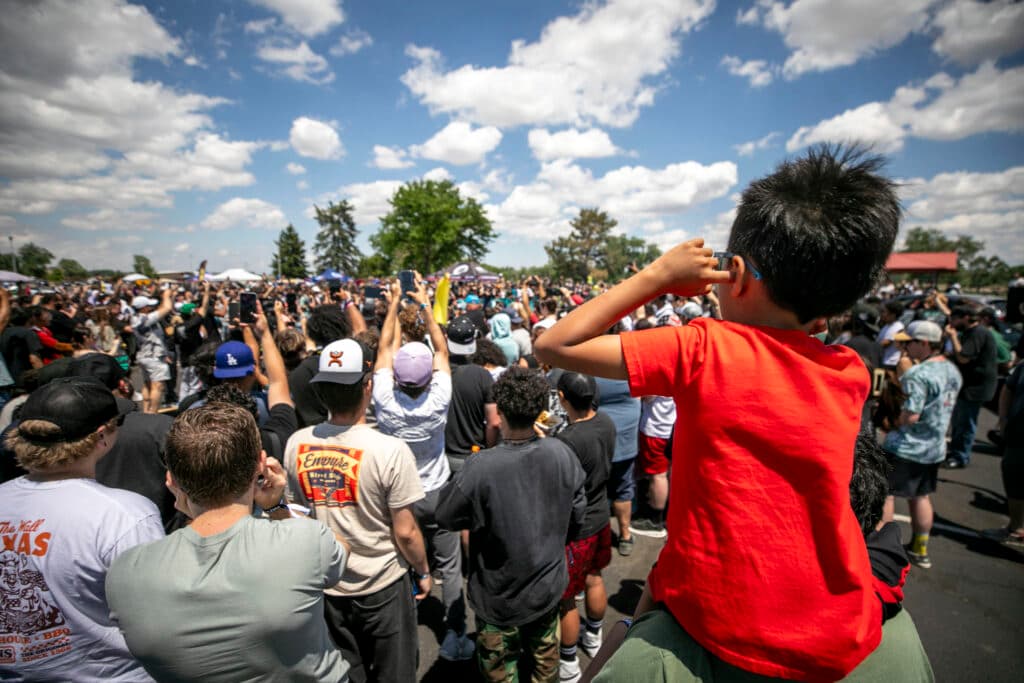
Meetup organizers are fighting a war of perception
Joey Williams and his friends behind the Nationwide Productions meetup group are usually pretty busy on summer Sunday nights. Nearly 50,000 people follow them on Instagram, many of whom watch the account closely as dusk falls.
Most weeks, Nationwide posts an address around 9:40 p.m., but only leaves it up for a few minutes. Those in the know see it, screenshot it, then hop in their cars to head to the sort-of secret spot.
They usually gather in parking lots in Aurora or Littleton — places that are close to highways. The meetups look similar to Ranasinghe’s with vendors that sell food as people look under hoods and swap tips. Kids lead parents through rows of motorcycles, lowriders and tuner cars.
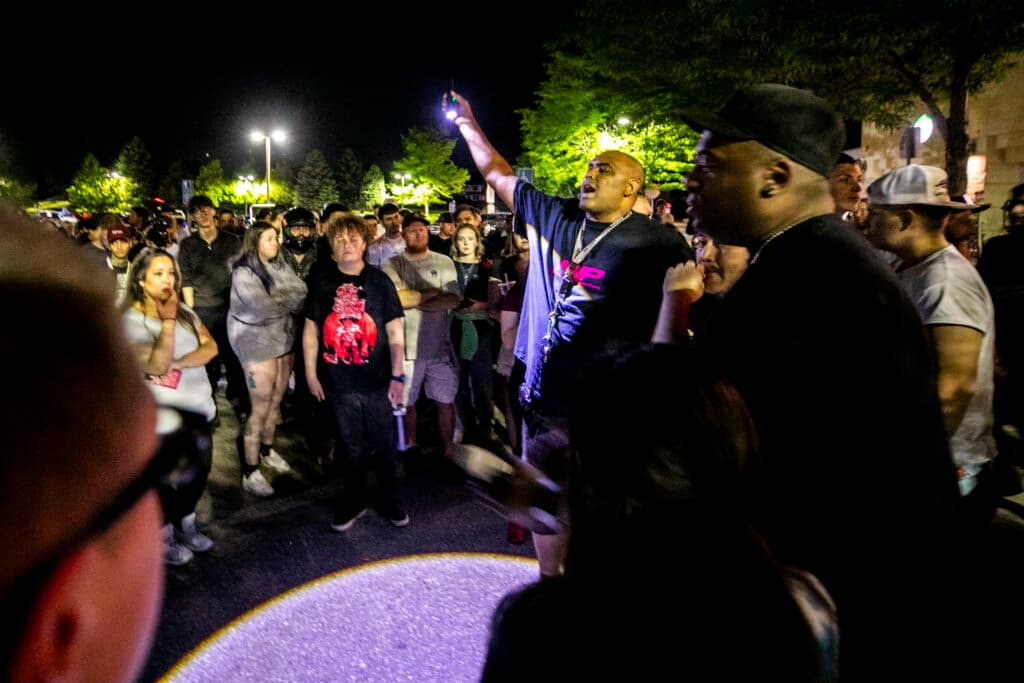
Once everyone has arrived, Williams flashes a light and makes noise to get their attention, then lays out a route for the night: maybe up I-470 to I-70, then east to Bennett, then back to the city.
He’s been leading these rides for nearly 30 years.
“It started in ‘96 with 15, 20 friends just getting together in a parking lot and chilling, having nice cars, working on 'em together all over the metro,” Williams told us.
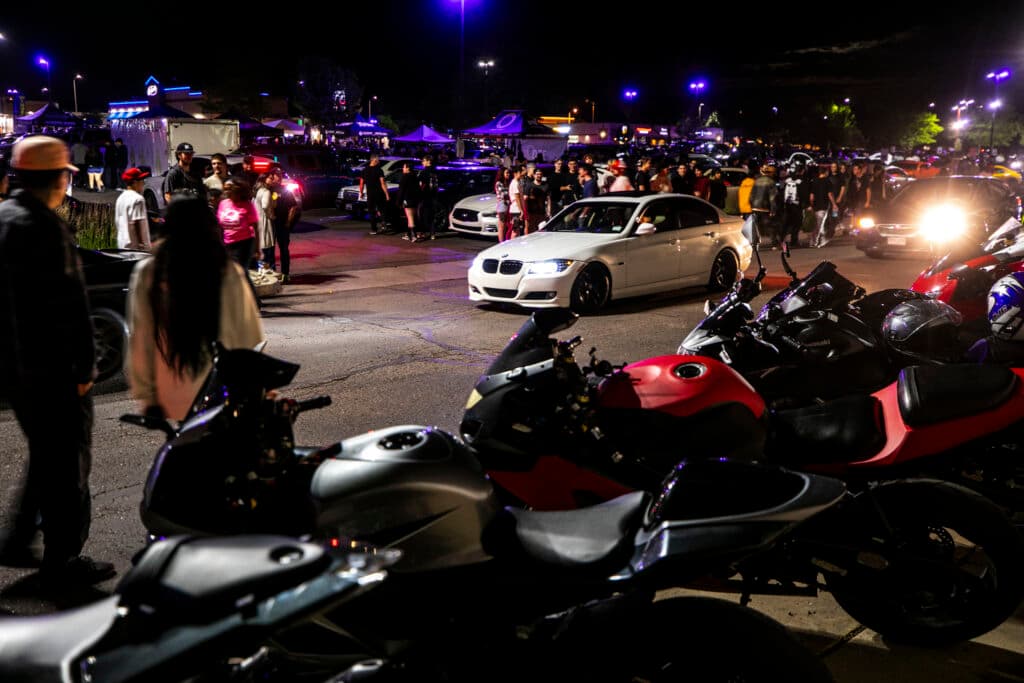
The meets grew steadily from there, but exploded as social media disseminated the culture in a much broader way. When more than 1,000 drivers showed up to a meet in 2011, not long after Nationwide created a Facebook page, they knew something had changed.
Today, even more people wait to see where Williams and his crew will post up each week.
“It’s kind of like a religion. I think if you do it every week, they expect something. So we just try to do something because, when we were kids, we looked up at our big friends like, ‘Hey, what are you guys doing? You guys got nice cars. We want to come see them,’” Williams said. “We're now kind of the older guys, so everyone looks up to us to do something.”
But running these events can be tricky.
Nationwide’s social media posts are filled with warnings: “Respect the spot. Zero tolerance. No revving or loud music.” They know they can only gather like this as long as property owners don’t complain, but it’s not always easy to keep so many people in line. Williams needed to stop a few times during our conversation to rush across the parking lot and tell people to quiet their engines.
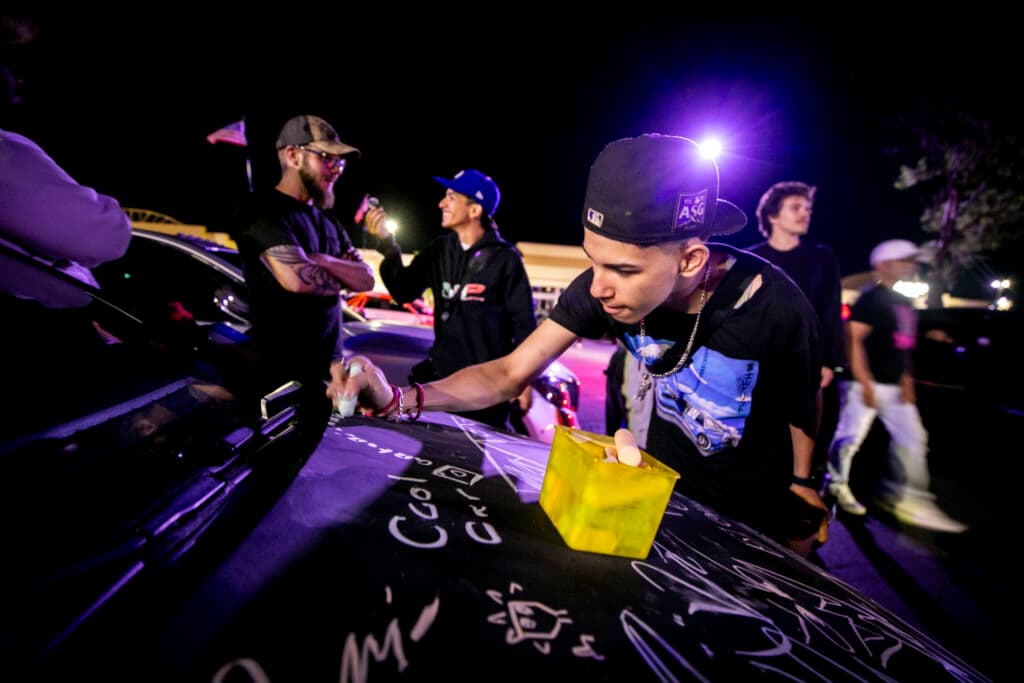
Marcus Beachley, who organizes Saturday night meets under the Simple Lifestyle brand, said he and Williams do their best to make these events safe, fun and legal. But unlike Ranasinghe, they haven’t turned their events into a business; they’re all volunteers.
“We love the sound of exhaust. But at the same time, there's a time and a place for it,” he told us. “We obviously want to respect the surrounding neighborhoods. We want to respect the properties that we're at.”
Besides, he added: People who are really sinking their finances into a car wouldn't risk ruining it by driving like an idiot.
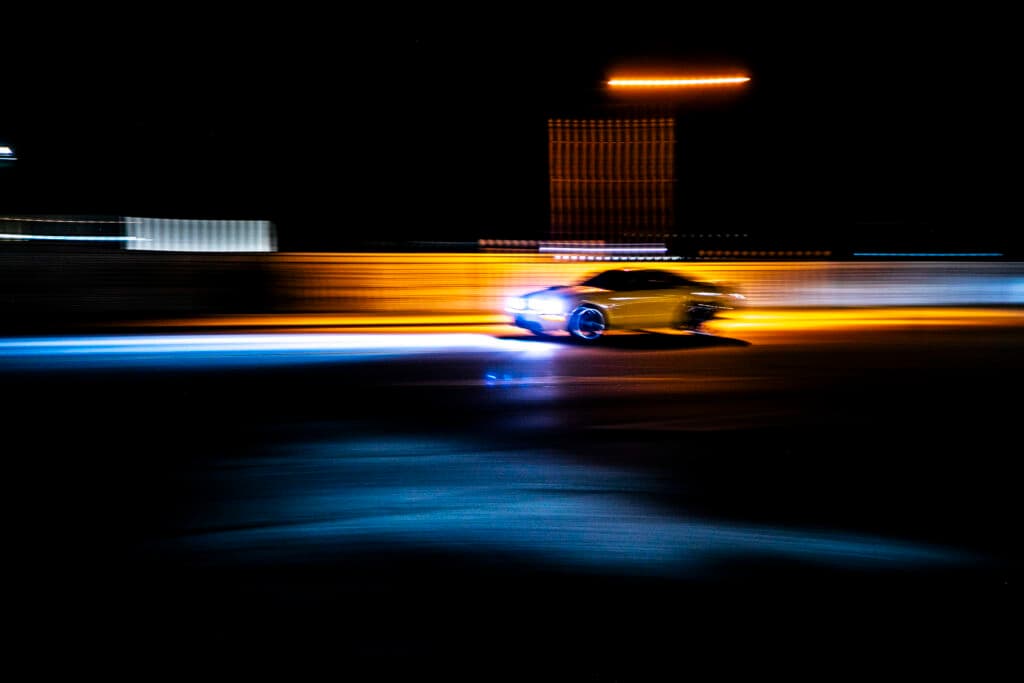
The enforcement is not just about maintaining the ability to gather. He, Williams and Ranasinghe know that a lot of people on the “outside” see them as troublemakers, and they're all working to reframe that notion.
“I think one of the biggest misconceptions is that we gather all these people here and condone the street racing and we condone revving and burnouts. And the biggest thing is that we want to gather and share the common passion that we all have, and that's cars,” he said.
This is personal for him.
“Growing up, I was bullied a lot. I didn't really have a place to really call my own. I didn't have a group of friends," he said. "But I found a family here … It’s just been literally a lifesaver at some points in my life.”
Local authorities are closely watching these events.
In June, Nationwide and Simple Lifestyle held their joint annual summer kickoff in Colorado Springs. It attracted some people from out of state, and ushered many people based in Denver down I-25. In the hours leading up to the event, hundreds of drivers in suped-up rides cruised down the highway. Police cars were parked along the interstate all night long.
It’s not uncommon to see law enforcement at Nationwide’s usual Sunday night gatherings. Sometimes, it’s an officer who’s happy to connect with organizers. Other times, cops arrive with lights flashing, usually following a car without a license plate.
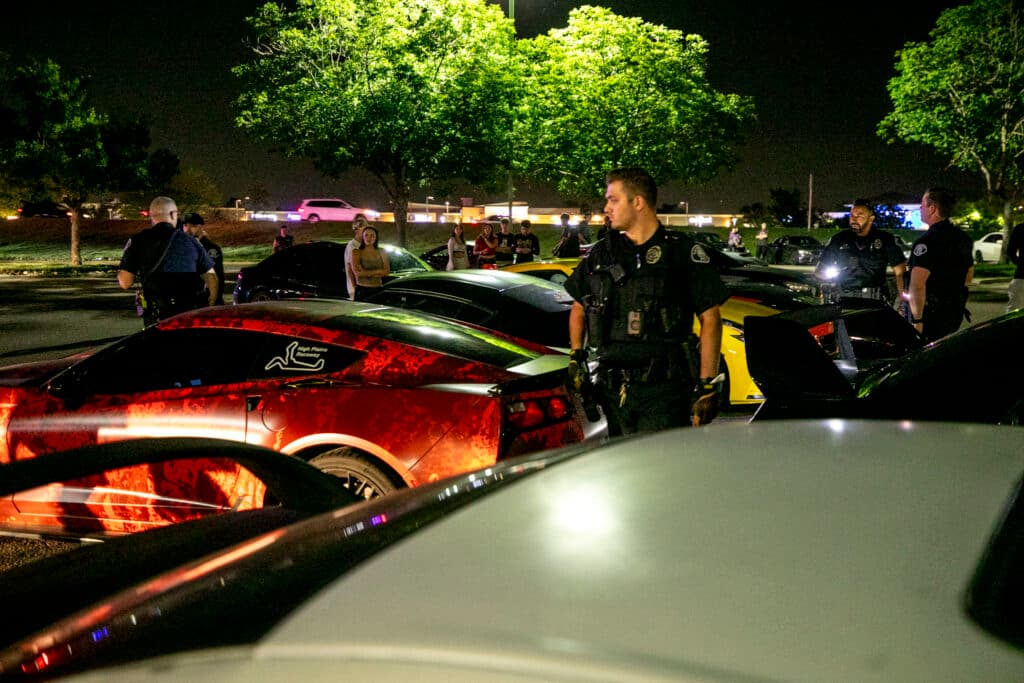
Lt. Kristy Garcia runs the Denver Police Department’s street racing task force, and said meetups and car culture got out of hand during the COVID-19 pandemic, when there was much more room to operate. She pointed to a “takeover” in 2021, when hundreds of drivers shut down I-225 in Aurora and turned it into a drag strip. DPD shut down lanes along Federal Boulevard in 2020 after people gathering in parking lots were blamed for a spate of shootings.
“We’re trying to make the change so that it’s not as comfortable for these groups to collect and cause the disturbances they do,” she said.
DPD gets a lot of complaints from local businesses, she said, and 311 gripes are constant.
Within city limits, she told us, DPD has orchestrated an increasing number of “trespassing agreements” in which property owners give officers blanket permission to oust unpermitted gatherings from parking lots. That, she said, has made an impact.
“My experience with this from last September on, is that the group size of the car clubs has increased, but the involvement in Denver has decreased, especially in the southwest corridor,” she said. “Our priority for that operation is the enforcement of the illegal activity, the dangerous activity, that can cause crashes, that’s a disturbance to the public.”
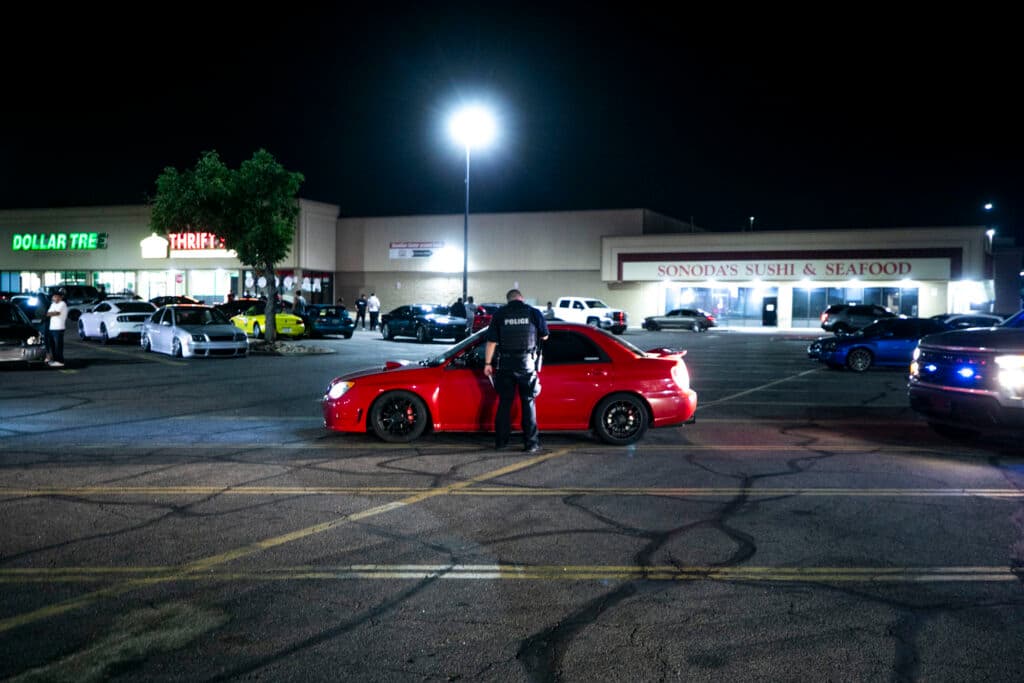
Garcia said her colleagues sometimes hear gunshots as they approach smaller groups gathered with cars and trucks, most likely a signal to disperse before cops arrive.
She’s also skeptical of larger events, like Nationwide’s, even though she recognizes organizers usually try to keep bad actors at bay.
“They don’t have the ability or means to control the people once they get there,” she told us.
Finding coexistence will probably continue to be tricky.
Williams and Beachley said their line to attendees is that “driving is a privilege,” and that it’s up to individual drivers to stay within the law.
Some people we met, like Elias Rodarte, said they are willing to toe the line after organized meetups and cruises have ended.
“Usually, around 3 a.m., we do this thing called Mexico. It's where we go to a street where nobody's active, and then we just sit there and just go car for car, just racing and shit,” he said. “For the most part, we like to keep it on a quiet street, where nobody's there at night, nobody could get hurt.”
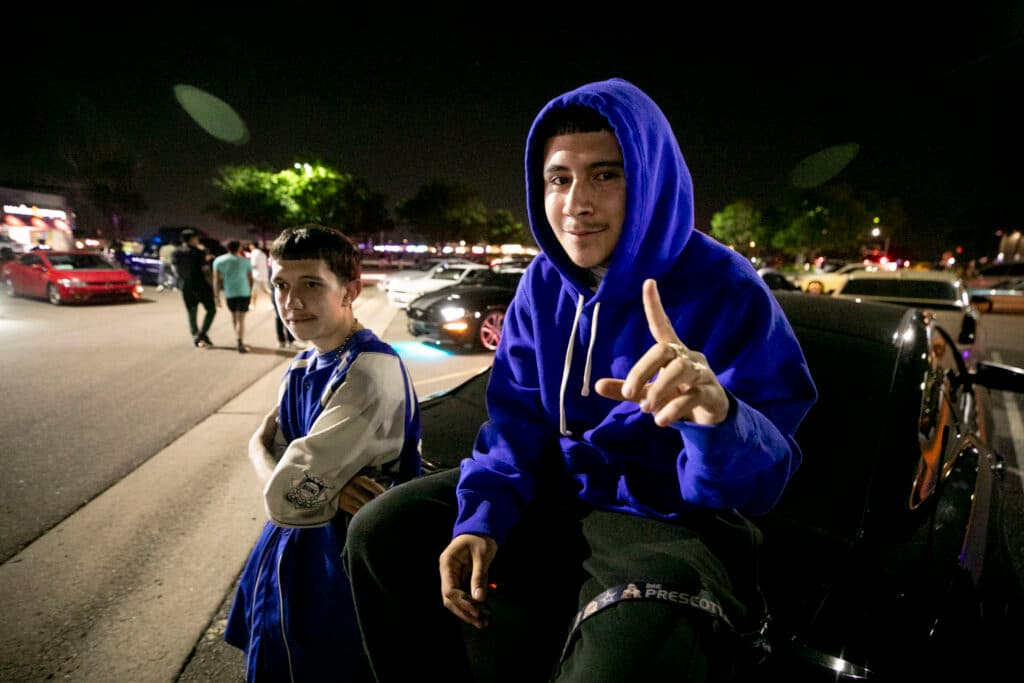
Other people we spoke to worry that this kind of behavior reflects poorly on their larger culture. There’s a lot of talk within the community about who’s to blame for increased police scrutiny.
Vincent Bui, who we met at Ranasinghe’s event in Adams County, said he’s enraged by street racers who he said bring down the entire scene.
“I hate them, bro. I don't like them … They're all ratchet,” he told us. “They don't know how to act. They don’t know how to control themselves.”
Jonathan McNally, a regular at both the daytime and nighttime events, said he’s got beef with drivers who push things too far.
“You're ruining the car scene. Stop it. Nobody thinks you're cool,” he said. “Swinging it in an intersection, you're blocking traffic. You're causing harm to other people.”
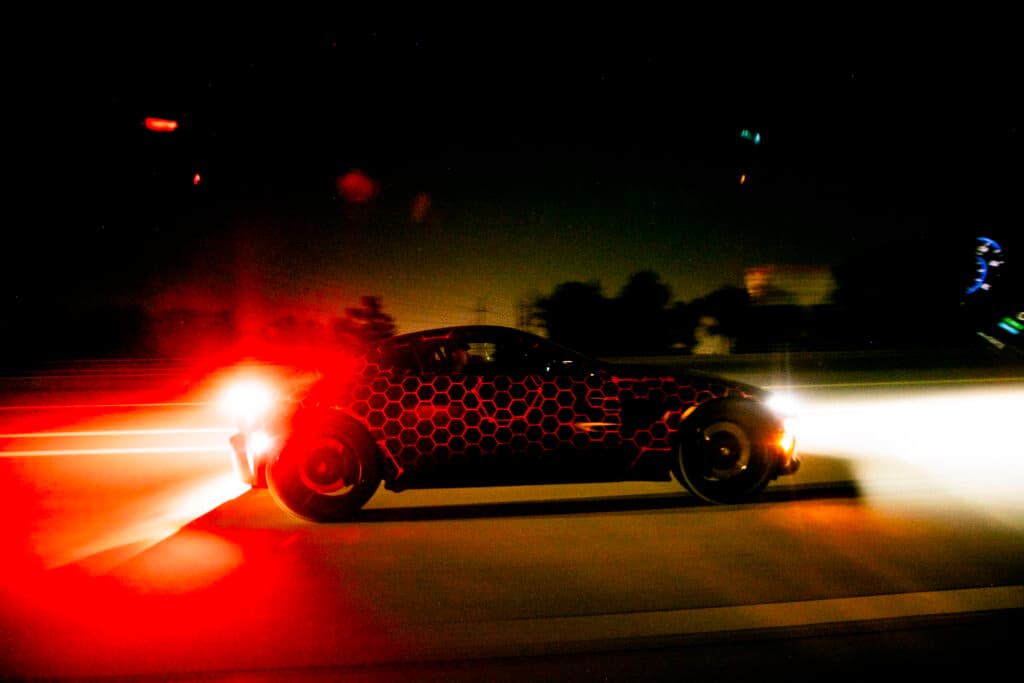
History repeats itself.
These discussions, about who actually belongs on city streets, are reminiscent of older conversations about lowriders in Denver. Cruising Federal Boulevard has long been part of the city’s Chicano culture, which was vilified for decades before City Council officially embraced its history a few years ago.
Council member Jamie Torres, who co-authored the proclamation celebrating lowriders, said that bad reputation was fueled by coded racism. That might be less of an issue with today’s car culture, she said, but she can see parallels between attempts to deal with lowriders and these newer, faster cars. She hears plenty of complaints about loud engines from her westside constituents.
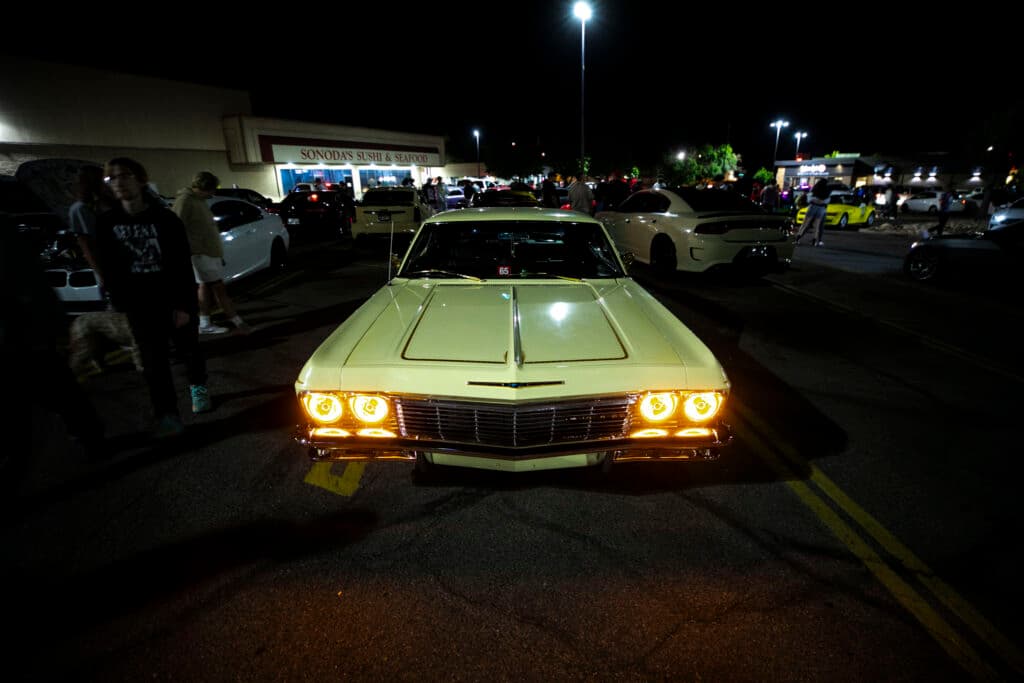
“It does kind of fringe into safety concerns, but it can’t be a broadly painted brush for everyone who has a muscle car, a lowrider, a motorcycle,” she told us. “It can’t just be that we’re zeroing in on just car people. That can never be the reason we’re prioritizing safety on our streets. It’s about what they’re doing in the moment.”
Maintaining that balanced perspective will continue to be important, she said, as the city tries to thread a needle between safety and allowing a legitimate subculture to thrive. It’s not like people will just stop driving, she said.
“It’s kind of a thrilling demonstration of youth. I think we’re always going to have that.”
